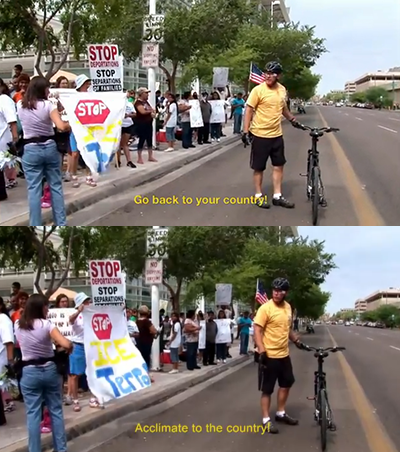Hats off to the producers of the PBS documentary film series "Independent Lens" for following through on a promise to correct the error we noted in their documentary about the rancorous Arizona debate over illegal immigration. Titled "The State of Arizona", the documentary was broadcast in late January around the country.
In one scene, the film shows a man walking his bike past a street demonstration outside the federal courthouse in Phoenix, where a judge was considering the state's anti-immigration law, known as SB 1070. Protesters against the law carried signs that read "Stop Racism", "Stop Deportations", "Stop ICE Terror", and "Immigration Reform Now". Counterdemonstrators carried signs reading "Stop the Invasion" and "Citizenship is a privilege, not a right".

It is a boisterous scene, so the film uses subtitles to show what the man with the bike shouted to the advocates of illegal immigrants. That is where the filmmakers committed the flagrant error. At the point where he shouts "Acclimate to the country," the subtitle reports the jarringly different demand to: "Go back to your country!"
But late Wednesday the subtitle was corrected, at least on the Independent Lens website. You can see it here at the 56:10 mark. One caveat, the film will only be available for Internet viewing through February 25.
We reported on the error in a January 31 blog that we emailed to the Independent Lens producers. That initiated a flurry of emails that also involved the filmmakers of the Arizona documentary, Carlos Sandoval and Catherine Tambini.
Last week I received an email from the senior producer of the documentary series, Lois Vossen, who wrote:
I became aware of this issue today and want to send a note that I agree with you. It is important that documentaries be accurate and if there is a factual error we always want to correct it. Independent Lens will correct the subtitling error you brought to our attention. My goal is to have the corrected version completed by COB on Tuesday and replaced on the PBS video player by COB on Wednesday. Independent Lens will also re-feed the corrected version to all PBS stations and do all we can to assure they only use the corrected version moving forward. Thank you again for bringing this to our attention. We appreciate your attention.
I was impressed by the professionalism and thoroughness of Ms. Vossen's message. I was also impressed by her commitment to correct the record. To be frank, I had thought our complaint might be stonewalled.
What makes the error especially significant is that it enforces the overall message of the film, which presents pro-SB 1070 activists as motivated either by hostility and anger or by a zealous intolerance and fearful unwillingness to accept change. While the film is eloquent in its presentation of the human plight of illegal immigrants ensnared by enforcement of immigration law, it does little to show the disruption and turbulence caused by the explosive growth of the state's illegal immigrant population — from 80,000 in 1990 to 560,000 in 2008 (according to the Department of Homeland Security).
In the blog I said the mistake was an honest one. I believed no one would make a mistake that could so easily be identified. But perhaps it is only easy for those of us who are attuned to the anxieties of people like the man with the bicycle.
I lived in Arizona for many years. I made my home in Phoenix during the big influx from Mexico that followed the peso collapse of the mid-1990s. I know how disruptive it was for the lives of many Arizonans, especially members of the working class.
That experience gave me a sensibility very different from that of Carlos Sandoval and Catherine Tambini. They are accomplished and respected filmmakers. However their narrow and biased sensibility is apparent not only in their framing of the Arizona story but also in Tambini's response to my report of the erroneous subtitle. In an email she wrote:
We so wish Mr. Kammer could have been in the editing room with us when we, our editorial staff and screeners at several rough cuts tried repeatedly to understand what the man was saying in that particular line. We had two of the best sound mixers in the business listen and none of us could make out exactly what he said. Our interest is always in being accurate.
I appreciate Ms Tambini's frank response. But it makes me less inclined to call the error an innocent mistake. If they couldn't "make out exactly what he said", why did they use the scene at all? By going with their gut they took one small step of misrepresentation in a film that is a giant leap of misrepresentation of the state of Arizona. They couldn't understand what they weren't able to hear.
